31 January 2025
How to Choose the Best Mobile App Development Company for Your Business Read More - Premium App & Web Development With Limited-Time Savings  Enjoy 20% Off All App & Web Services
Enjoy 20% Off All App & Web Services  Claim Your Offer Today -
Claim Your Offer Today -
If you want to build software today you need more than just code. Smart, Fast, Lean Building, This is what it is about.
Every product owner, CTO, or founder is stuck in a balancing act to:
And yet still… ship a product that people love.
Now, here comes the uncomfortable reality, the conventional hiring dedicated software development team is more like a broken picture of old-school companies trying to fit a tech-driven business model, today.
Hiring in-house developers? Expensive and painfully slow. Relying on freelancers? Lack of consistent quality, fragmented communications, and no long-term accountability. Stumbling to scale into an overworked and under-capacity internal team? When burnout hits, things become stagnant for all of us.
Well, the idea of having a dedicated development team flips the script. As the team that you will hire will not only work in your setting but will be solely focused on your product and be invested like an in-house team without being a headache.
Think of it like this:
So, hiring a dedicated app development team is not only a wise decision but a strategic move that every business should make.
As per Statista, the worldwide market for IT outsourcing is projected to pass $588.38 billion in 2025. Why? Because it enables companies to scale quickly, keeping costs manageable and gain access to the best professionals across the Globe, without sacrificing quality.
In this blog post, we will explain why dedicated teams are not a buzzword of the year but a reasonable investment. We’ll unpack:
What a dedicated software development team is; what it isn’t
If you are building a product that matters, you need to rethink team building. Let’s dive in.
Probably you have come across the term “dedicated development team” in your technology journey but do you know its essence?
Simply put, a dedicated development team is a group of software professionals developers, designers, QA engineers, project managers, DevOps experts working exclusively on your project. They are available full-time, normally via a development partner or agency, but they operate as if they are a part of your internal team.
Unlike freelancers or a traditional outsourcing model, a dedicated team does not split its focus between clients or projects. You hire them for your product. They go to sleep thinking about your roadmap. And they have And they are answerable to your success; one day after another.
Now we will explore this a bit more.
Visualize a dedicated software development team as your offshore or nearshore tech department the absence of hiring hassles, overhead costs, or management bottlenecks.
Your team might include the following, depending on your business requirements:
You select the size, skillset, experience and seniority. Either way, you manage these individuals as you would your own team—or hand them off to a project lead, if that’s more your style. The key? You still have control though, but not the control that will weigh you down.
Ownership stays with you and you will always carry your product vision with you. But the heavy lifting of the technical work, is done collaboratively with the committed professionals who know your market, your goals and your product lifecycle.
This model is ideal for businesses that require long-term commitments, are product-focused, or want scalable operations without having the headache of hiring, onboarding, or housing resources previously.
To truly appreciate the value of a dedicated team, let’s compare it with other common approaches:
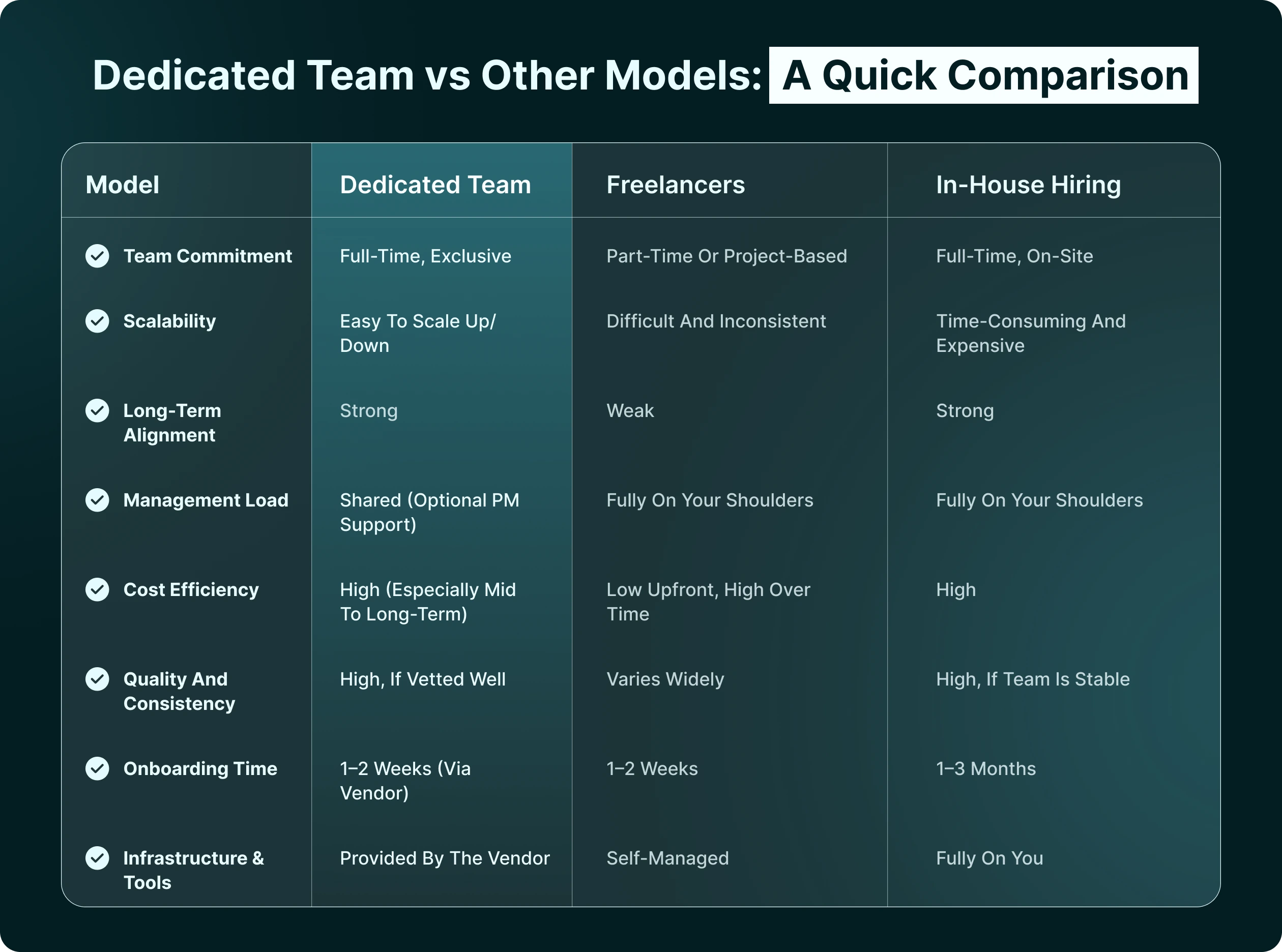
Freelancers may seem affordable upfront, but often result in inconsistent quality, missed deadlines, or hidden costs due to repeated corrections. In-house teams are reliable but come with substantial overhead—recruitment costs, office space, benefits, retention challenges, and more.
Dedicated teams strike the right balance: you get dedicated, skilled professionals aligned to your product, with minimal operational burden and flexible engagement terms.
Mobile and web applications often require laser-sharp product focus. From sprint planning to continuous releases, a dedicated app development team ensures your product evolves with clear direction, ownership, and speed.
Let’s consider a simple example:
A healthtech startup is building a mobile app for real-time patient monitoring. They have:
A vision,
A product roadmap,
But no internal tech team.
They could either:
Hire in-house (take 3–6 months, high cost),
Work with freelancers (low control, fragmented output),
set up a dedicated app development team through a trusted vendor.
With the third route, they onboard a team in 2 weeks: 2 mobile devs, 1 backend dev, 1 QA engineer, and a part-time project manager. This team stays with them through MVP, user feedback cycles, feature upgrades, and investor demos ensuring continuity, speed, and technical maturity.
That’s the power of dedicated team that works for you
Here’s a quick structure you can expect in a typical software development dedicated team setup:
You can start with a small team and scale as your product evolves. Add a DevOps engineer during deployment phases, or bring in a dedicated designer for a UI overhaul—the structure is modular and dynamic.
Here are the reasons why enterprises also start adopting this model.

In the next step, we will have a look, at what is the right time to hire a dedicated development team also share the case studies of companies who used it to cut down RSA (Research & Service Approval Pricing) and deliver faster solutions.
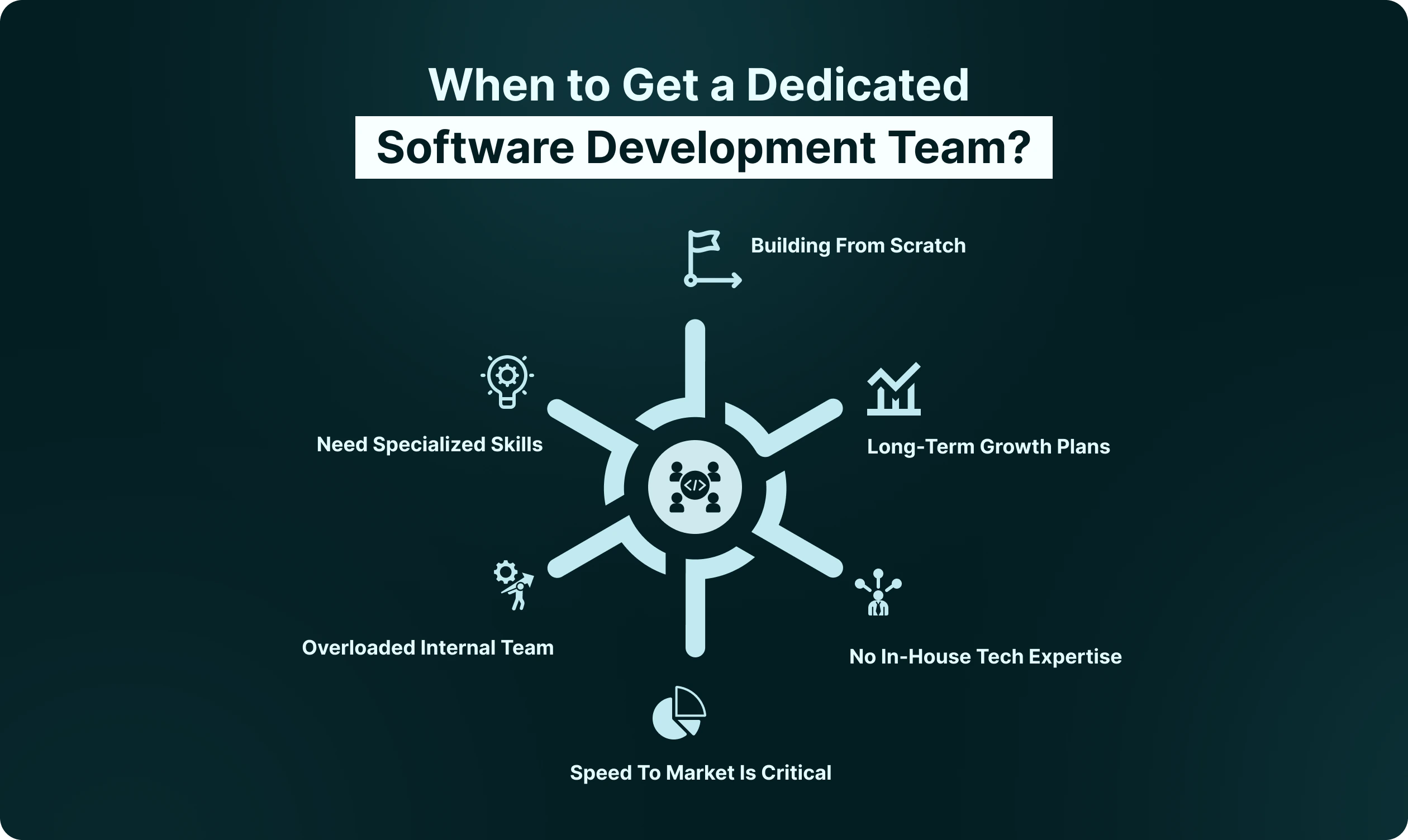
Picking a development model is not merely a checkbox exercise it is more about timing and context. No matter how brilliant a strategy is, it will fall flat on its face if not implemented at the right time. So at what point hiring a dedicated software development team becomes not just doable, but also required?
So, all the typical business scenarios, why it works for real businesses, and even the smallest of businesses can use this model and still not break the bank.
When you’re launching an MVP or developing a full-fledged software platform, every decision matters. You need more than just a group of developers—you need a cohesive team of experts in design, development, QA, and DevOps, working together from Day 1. A dedicated team offers this seamless integration, allowing you to hit the ground running and accelerate your time-to-market. This early alignment not only saves you time but also ensures that your vision is executed exactly as planned, leading to faster product launches and a quicker ROI.
Benefit to You: With a dedicated team, you avoid the pitfalls of assembling different specialists, and you accelerate the process of transforming your ideas into market-ready products.
As your business grows, so does the complexity of your product roadmap. If you have plans stretching over the next 12 to 24 months (or even beyond), maintaining a consistent and skilled development team becomes essential. Freelancers and short-term contractors can create gaps, leading to instability and knowledge loss midway through the project. A dedicated team ensures that your product evolves alongside your company, preserving both technical continuity and momentum.
Benefit to You: A long-term, dedicated team offers stability, continuity, and expertise, giving you the peace of mind that your product will continue to grow in line with your business objectives—no matter how complex the next phase becomes.
Many startups or growing businesses have incredible ideas but lack the technical expertise needed to execute them. Hiring a full-time tech team is often too expensive and time-consuming at this stage. A dedicated team solves this problem by giving you immediate access to skilled developers and engineers, without the overhead of recruitment and training.
Benefit to You: With a dedicated development team, you gain the technical knowledge you need without the financial burden of hiring full-time employees. This gives your business the flexibility and expertise it needs, exactly when you need it.
In today’s competitive environment, speed is everything. Whether you’re facing aggressive competition or need to meet customer demands quickly, getting to market faster can make all the difference. A dedicated team eliminates the bottlenecks that slow down internal hiring or outsourcing to freelancers, allowing you to focus on rapid development and deployment.
Benefit to You: With a dedicated team, you cut through the noise, accelerate development cycles, and launch products on time—giving you a significant edge over competitors who are stuck in the slow lane.
Even the most capable in-house development teams can become overwhelmed with the demands of growing businesses. Whether it’s managing new features, product updates, or handling integrations, there are times when you need additional capacity. This is where a dedicated team comes in, seamlessly integrating with your existing team to provide the bandwidth needed during crunch periods.
Benefit to You: You can quickly scale your development efforts without overburdening your internal team, ensuring that your business can handle the demand without sacrificing quality or timelines.
In some cases, your project may require specific, niche skills that your internal team simply doesn’t have—like expertise in React Native or setting up complex DevOps processes. A dedicated team can fill these gaps by providing specialized skills on-demand, ensuring that you don’t have to compromise on the quality or scope of your project.
Benefit to You: Gain access to specialized talent that’s hard to find or afford in-house, allowing you to leverage the best expertise available without the long-term commitment of hiring full-time employees.
Let us now explore some of the real-world examples who have utilized the software development dedicated team for developing their products and made it big.
The story goes that before Slack was a huge workplace communication tool, it was just the team working on a project that wanted to have a better communication tool, so they hired a Canadian design and development agency to create a prototype. Why? So they can focus on business + user strategy while they have a reliable, dedicated and scalable team that can bring your product right to your door.
That early investment into a specialized development team set the stage for what would eventually end as a product used by millions around the world.
While in the growth stage, Alibaba also outsourced a lot of the technical functions to overseas developers through dedicated partnerships. This allowed the company to scale quickly, keep a lean model and used internal resources on strategic initiatives, not operational bottlenecks.
TransferGo, a fast-growing fintech company, used a dedicated team to support its backend operations and integrations. Doing so allowed them to scale quickly and across countries, without ever compromising on stringent data safety and regulatory compliance requirements, which a bunch of freelancers would never be able to manage.
The common thread stretching between these examples: if you only think of dedicated teams when in need of an extra hand, or if you believe dedicated teams are only for companies lacking in-house capacities, we’d like to convince you otherwise.
It is often incorrectly assumed that dedicated teams are only for the big players or VC backed start-up companies, That’s simply not true. Small businesses may even benefit the most. Here’s why:
Whereas getting local hires takes months and thousands of dollars, small businesses can leverage right talent in a pay-as-you-go model. From there on, they can either raise scale slowly as in 2–3 team members and work their way up as their requirements grow.
Dedicated teams work preferably with monthly retainers or milestone-based contracts. For small businesses who run on a knife edge when it comes to their finances, that brings cost transparency and financial planning.
For small teams, managing the hiring, payroll, compliance, and IT set up for a technical team can truly be overwhelming. A good vendor takes care of those logistics with a software development dedicated team, giving small business owners the freedom to focus on growth and product-market fit.
Many small business owners do a little bit of everything. They now have a team ready to take care of tech execution and can focus instead on marketing, customer relations, fundraising, or business development.
Still wondering if you’re ready? Here are a few signals that indicate the time is right:
You’ve validated your product idea and need to scale development.
Your current team is at capacity, and project deadlines are slipping.
You’re spending more time managing freelancers than growing your business.
You’re planning a new feature release or expansion that requires speed and expertise.
You want long-term, stable development without the overhead of internal hiring.
If any of the above applies, you’re not just ready; you’re overdue.
To be fair, this model isn’t perfect for everyone. Here are a few cases where another approach might be better:
But even in such cases, many businesses start with freelancers or hybrid models and eventually move to dedicated teams as their needs grow.
Hiring a dedicated software development team isn’t just a fallback when in-house hiring fails. It’s a forward-thinking strategy for companies that value speed, flexibility, quality, and cost control.
You should consider hiring a dedicated team for software development if:
You’re building a product from the ground up and want it done right.
You have long-term plans and need continuity in your tech team.
You want expert talent without full-time employment liabilities.
You’re running lean and need a team that can deliver fast.
You’re scaling quickly and don’t want your tech to become the bottleneck.
In the next section, we’ll break down how this model impacts your bottom line—and why it often proves more affordable than the traditional alternatives.
Cost-effective allows CTOs, founders, and product leaders to spend less but spend specifically. On the surface, hiring a dedicated software development team appears like a premium move but ultimately the value is what you get for the retail price. Compared to costly, unreliable, and high-maintenance home-grown teams or freelancers, the dedicated model often takes the gold medal on ROI, quality, and operational efficiency in the long run.
So if we unpack the cost layers, it may present a viable business model to work with.
Below is a simplified comparison table that outlines the key cost components involved in each model:
| Cost Category | In-House Team | Freelancers | Dedicated Team |
|---|---|---|---|
| Salary | High (with benefits, tax) | Varies by hour/project | Fixed monthly/retainer |
| Recruitment & Onboarding | High | Low to moderate | None (vendor-handled) |
| Training & Ramp-up | High | Medium | Low (experienced, pre-vetted) |
| Infrastructure & Tools | Required | Partially required | Included or vendor-managed |
| Retention Costs | High | None | None (contract-based) |
| Management Overhead | Full responsibility | High (multiple freelancers) | Moderate (dedicated PM if needed) |
| Downtime/Productivity Loss | Common during transitions | Frequent (inconsistent output) | Rare (stable & committed team) |
| Scalability | Slow | Unpredictable | Agile & flexible |
From this comparison, it’s clear that while freelancers may seem cost-effective for one-off tasks, they often incur hidden productivity costs—like communication breakdowns, inconsistent code quality, or missed deadlines.
In contrast, dedicated teams strike the balance between affordability and reliability, especially when your project scope spans multiple months or requires consistent updates and iterations.
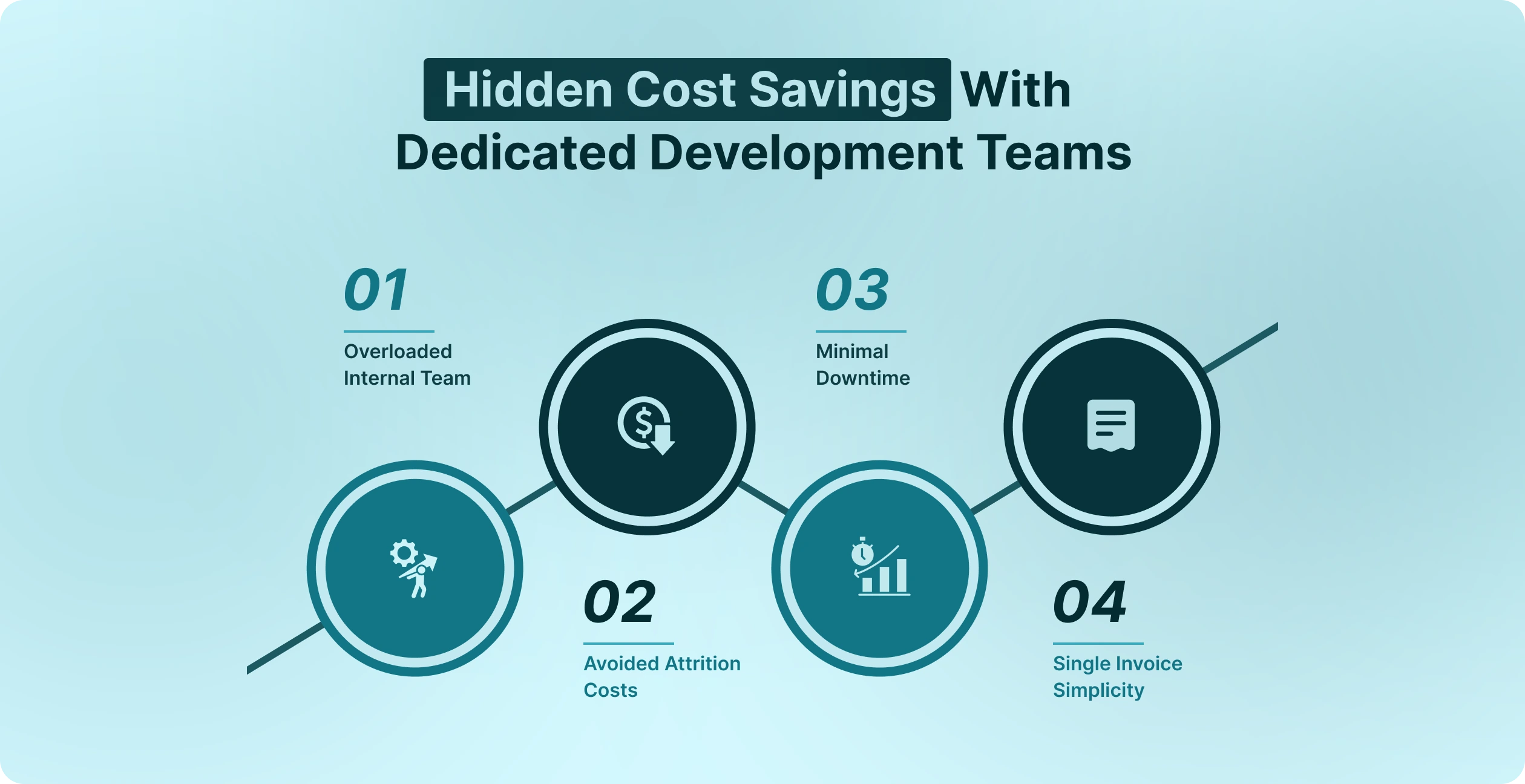
In addition to the ones that are apparent, such as salaries and tools, a dedicated team saves you money in indirect but very important ways.
The time it takes to hire in-house developers is around 30 to 60 days, but this timeline can extend even longer, and then you need to pay for job ads, expenses for interviews, human resources staff for onboarding, etc. A true partner, ahead of the game, with teams fresh and ready to go within a matter of days.
Lastly, higher in-house turnover is a bigger killer than just your culture, it also kills delivery times and morale. A dedicated team for software development prevents attrition problems, as replacements are filled in promptly and do not stall progress.
Teams are dedicated and aligned to your time zones and product vision. This focus minimizes lost hours or distractions that come with mixed teams, or more loosely managed freelancer groups.
No need to accommodate office expenses, software licenses, or hardware costs. The team is operating in a well-set up environment further reducing your CapEx & OpEx costs.
Instead of managing multiple invoices, taxes and compliance docs for individual freelancers or internal employees, you receive a single monthly invoice, which simplifies things for accounting and vendor management.
When you hire a dedicated software development team, you’re not just paying for hours; you’re investing in:
Speed to market
Consistent product quality
Easier scaling
Greater strategic focus
Over time, these elements directly affect your bottom line.
Let’s say you’re launching a SaaS product with a go-to-market timeline of 6 months. Here’s how the costs might differ:
| Development Approach | Monthly Cost | Time to Launch | Total 6-Month Cost | Risks |
|---|---|---|---|---|
| In-house Team | $50,000+ | 7–9 months | $300,000–$450,000 | Delays in hiring, retention issues |
| Freelancers (3–4 total) | $20,000–$25,000 | 7–8 months | $140,000–$160,000 | Coordination gaps, variable code quality |
| Dedicated Development Team | $30,000–$35,000 | 5–6 months | $180,000–$210,000 | Lower, since team is cohesive and focused |
Even though dedicated teams may look more expensive than freelancers at first glance, the faster time to market, fewer errors, and seamless team integration reduce long-term costs significantly.
The true cost of poor quality is greater than you want to believe. As CISQ highlights, in 2020, the poor quality of software cost U.S. companies more than $2.08 trillion, mainly because of various rework, technical debt, and system failure costs.
Having a dedicated software development team brings all that process maturity in, along with coding standards, accountability, thereby reducing these losses from the very beginning.
Having a dedicated team means you are not shipping half baked features, wasting months debugging, or churning customers because of bad UX. In terms of price, that sort of quality opportunity is difficult to come by but priceless to your business.
Instead of asking, “What is this going to cost me?” The correct way to ask is “What does it cost not to do this right?”
You can have a dedicated software development team that is cost-effective in building, scaling, and maintaining with good speed and quality. They take away the pain from building a product and leave you to worry about growing, your next fundraising, or customer success. Next, we will discuss what other benefits (besides cost) dedicated development teams provide.
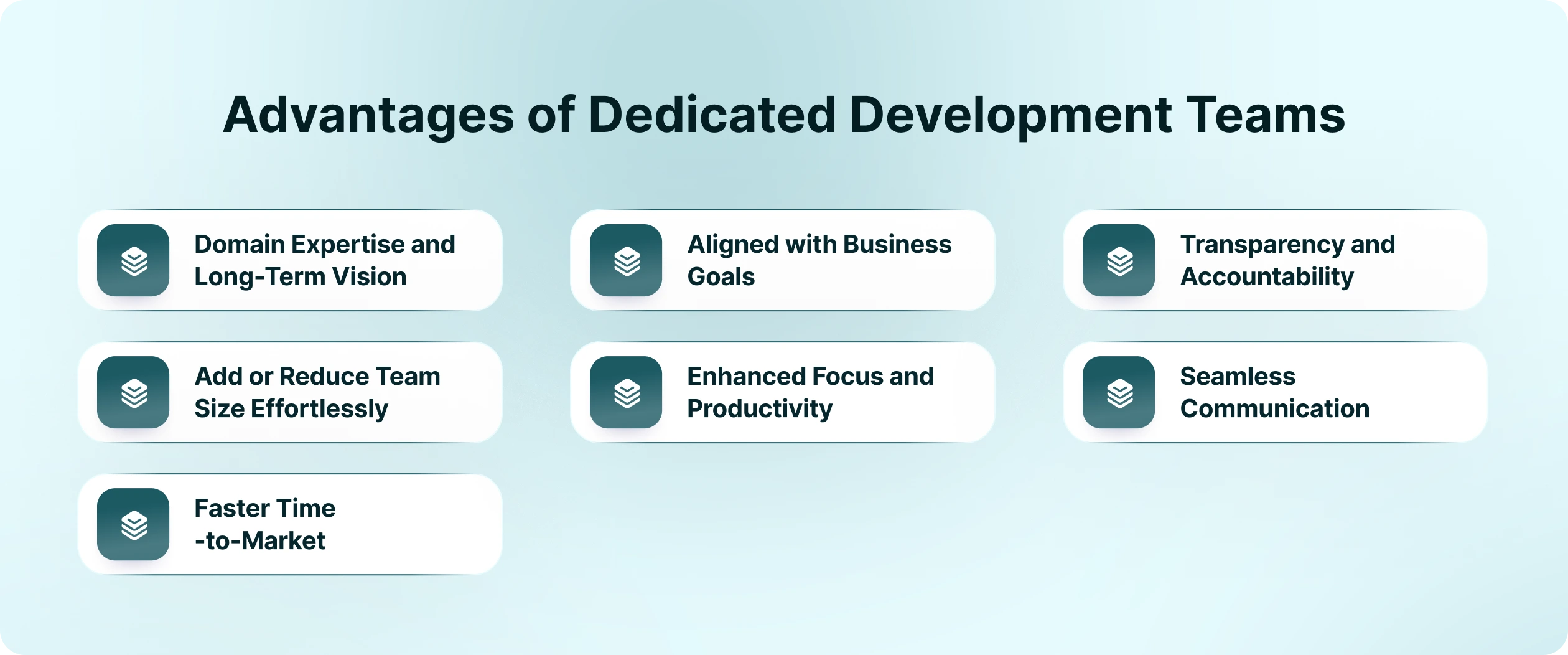
No one offers you a dedicated software development team just to bridge the tech ability gap; they offer their support to help you build that product-first business culture that is agile, accountable, and focused on outcomes.
While cost savings and flexibility are important dedicated software development team benefits, the true benefit comes in the form of an integrated team that feels like an extension of your company.
Here are the primary reasons why dedicated development teams are the most appealing model for CTOs, founders and product leaders around the globe.
Our development professionals offers you:
Building a dedicated development team is not haphazardly done. It is ready according to the need of your project, vertical, and technology Stack. This indicates that you are not simply employing coders but rather those who have previously dealt with the obstacles, vocabulary, and standards of the sector you are working in.
Why it matters:
Example:
Prebuilt compliance workflows and a modular architecture helped a fintech startup working with an on-demand component team dedicated to its financial services domain reach the market 30% faster.
You set your goal, and we build a dedicated team to serve that goal — that is not the case with outsourcing with a fixed scope or freelancing on a piecemeal basis. They stick to your roadmap, align with your product vision, and iterate with your internal stakeholders.
Key benefits:
This alignment drives better ownership and accountability, which are typically missing in traditional outsourcing models.
When collaborating with external teams, visibility into progress and accountability is one of the top concerns. When you have dedicated teams, that’s there, built in.
Most of the teams work with Agile or Scrum with:
Bonus:
Interaction with developers/architects/QA directly and not through a project manager, will ensure that all layers are on the same page.
This is a common situation for startups; you need to hire dedicated software development teams but hiring too early wastes money and hiring too late slows growth.
By having a dedicated software development team you can scale your team size up or down according to your project lifecycle:
Bringing in the right expertise only when you need it helps keep the ball rolling without the time and cost overhead associated with traditional hiring.
While freelancers tend to work with multiple clients, a dedicated team is laser focused on your product. That focus translates into:
Because they function as a single unit with common KPIs, the synergy makes them an order of magnitude more efficient than loose collections of resources.
While you might expect a dedicated team for software development to be technically proficient, modern dedicated teams undergo training on effective communication and collaboration across time zones. Many vendors now offer:
In competitive industries, time is your greatest asset. Dedicated teams allow you to:
Mature Agile workflows and focused project planning ensure that your MVP or next release is live more quickly, allowing you to capitalize on early user feedback and investor interest.
To summarize, hiring a dedicated team of software professionals gives you a competitive edge.
Here, we will clear up the most common myths and expectations vs reality, so that you can make an informed and educated decision with confidence.
Misconception: Hiring a team sounds like it will cost more than just hiring a few freelancers.
Reality: On the surface, yes; a team may have a higher monthly rate than individual freelancers. But when you account for productivity, stability, and quality, dedicated teams are often more cost-effective in the long run.
Freelancers may:
Work on multiple projects simultaneously
Deliver inconsistent quality
Require more time managing and coordinating
Dedicated teams, however:
Are fully aligned with your goals
Include a project manager or tech lead (often at no extra cost)
Work faster and with more accountability
Freelancers can be great for one-off jobs. But if you’re building or scaling a product, a dedicated team gives you reliability and speed—often saving both time and money.
Misconception: Outsourcing the development work means losing control over code, priorities, and direction.
Reality: In the dedicated team model, you retain full control. Unlike traditional outsourcing where deliverables are pre-scoped, dedicated teams work alongside you, using your preferred tools and processes.
You decide:
The roadmap
Sprint priorities
Development workflows
Communication cadence
Teams are typically integrated into your daily standups, Slack channels, and even internal documentation platforms. This fosters transparency and keeps you in the driver’s seat.
Misconception: Working with remote or offshore development teams leads to delays, miscommunication, and unproductive handovers.
Reality: This might have been true a decade ago—but today’s global development partners design teams around collaboration. Many vendors:
Offer teams with significant overlap with your working hours
Assign fluent English-speaking project managers
Use tools like Slack, Zoom, Jira, and Notion for real-time syncs
Additionally, dedicated teams often follow Agile or Scrum frameworks, which ensure daily updates, clear reporting, and fast feedback loops.
Tip: When hiring, ask about time zone overlap, communication protocols, and the team’s remote work culture.
Misconception: Working with an external or offshore team risks data breaches, code leaks, or IP theft.
Reality: Reputable development partners enforce strict NDAs, code access controls, and data compliance standards (like GDPR, ISO 27001, or SOC 2). Most vendors have well-defined legal and technical safeguards to protect your assets.
Best practices include:
Code stored in your private Git repositories
Work done within your cloud infrastructure
Role-based access to sensitive data
Strong legal contracts with non-disclosure clauses
To mitigate risks, choose a vendor with a solid compliance track record and transparent security policies.
Many founders think a dedicated team is the same as outsourcing. That’s a misconception.
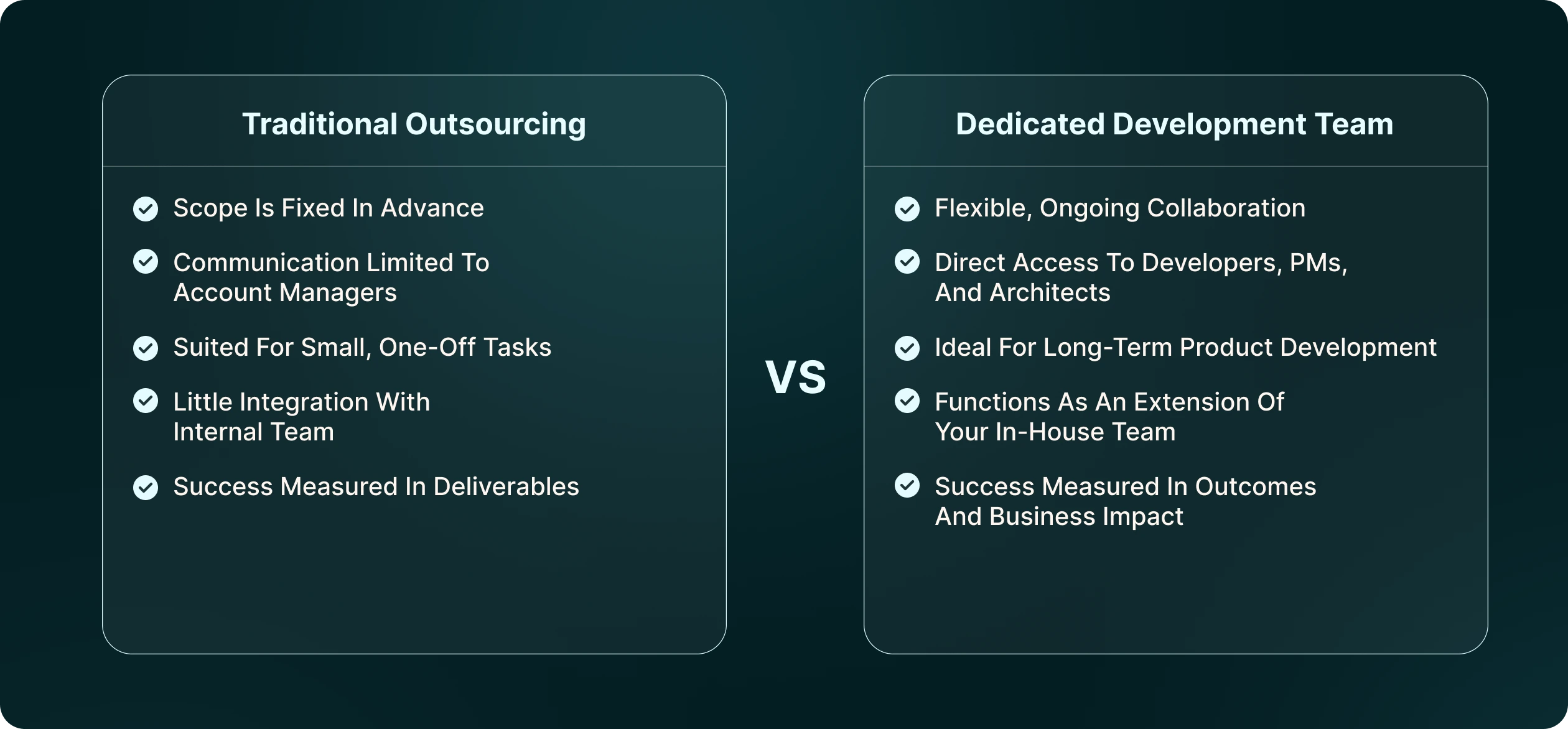
Dedicated teams are not vendors; they’re collaborative partners—built to evolve with your product.
In a freelancer or outsourced model, it’s true that control can become blurry.
But in the dedicated team model:
The model is designed to give you full control—with zero micromanagement.
This is one of the most persistent misconceptions, especially for startups handling sensitive data. But top-tier development partners invest heavily in:
If your business requires HIPAA, PCI-DSS, or other compliance standards, you can choose a partner with domain-specific experience. Security isn’t compromised in the dedicated model—it’s strengthened.
Whether you’re a seed-stage startup or a growing enterprise, a dedicated team gives you more flexibility than hiring in-house and more reliability than freelancers.
If you’re hesitant about dedicated teams because of outdated outsourcing concerns, it’s time to reframe your thinking. The modern dedicated model is:
Transparent
Secure
Scalable
And fully under your control
Up next, we’ll walk you through how to successfully hire a dedicated software development team—including vetting tips, setting expectations, and ensuring a productive 90-day onboarding process.
So it gets all the more essential to give your team the right long-term education — from vetting to onboarding
However, this does not only mean filling talent gaps; rather, hiring a dedicated software development team means strategic partnership. A good hiring process makes your team an extension of your business rather than a mere outsourced team.
Here’s how to do it right:
Get clarity on the following first before reaching out to vendors:
A clearly defined scope helps the vendor to handpick the right specialists and provide a realistic time & budget estimate.
Look beyond hourly rates and evaluate:
Schedule discovery calls with 2–3 vendors to assess their responsiveness, clarity, and approach.
Once hired, align the team with:
This clarity ensures measurable progress and a shared definition of success.
The first 3 months set the tone. Focus on:
Begin with a pilot sprint to assess fit, velocity, and quality of deliveries. Iterate from there. The hiring process is not transactional; it is the formation of a partnership based on alignment, ownership, and collaboration together with a dedicated team. When executed properly, it delivers speed, scale, and quality—without the headaches and costs of insourcing.
Put appropriate tools in place to get the best out of your team both in terms of efficiency and communication and ultimately in terms of accountability.
The combination of the right technology stack makes it much easier—and more productive—to manage a dedicated software development team. Here are some categories and tools that you really want to watch for:
Keep conversations seamless and real-time:
Ensure visibility and task ownership:
Maintain code integrity and efficient deployment:
Centralize all your resources and documentation:
By using these tools strategically, you foster transparency, enhance productivity, and enable smooth cross-border collaboration.
Choosing a Dedicated Software Development Team is more than just expanding your workforce; it’s about implementing a flexible, long-term, and cost-effective model that perfectly aligns with your business vision.
This offers a dedicated team to build quickly, or a scalable tech extension if you’re a growing enterprise that wants to:
This avoids the typical limbo of traditional outsourcing, or costly waiting time for in-house talent acquisition. But most importantly, you get a team that you can trust, that exudes laser focus, and is fully integrated; it feels like your own team.
When implemented with the right partner, this model allows you to build faster, few resources go towards shipping, while enabling you to keep up with a changing market.
Ready to Experience the Dedicated Advantage? Let’s help you find the right team—without the guesswork.
Get matched with Dev Story’s strong vetted dedicated software development team tailored to your needs.